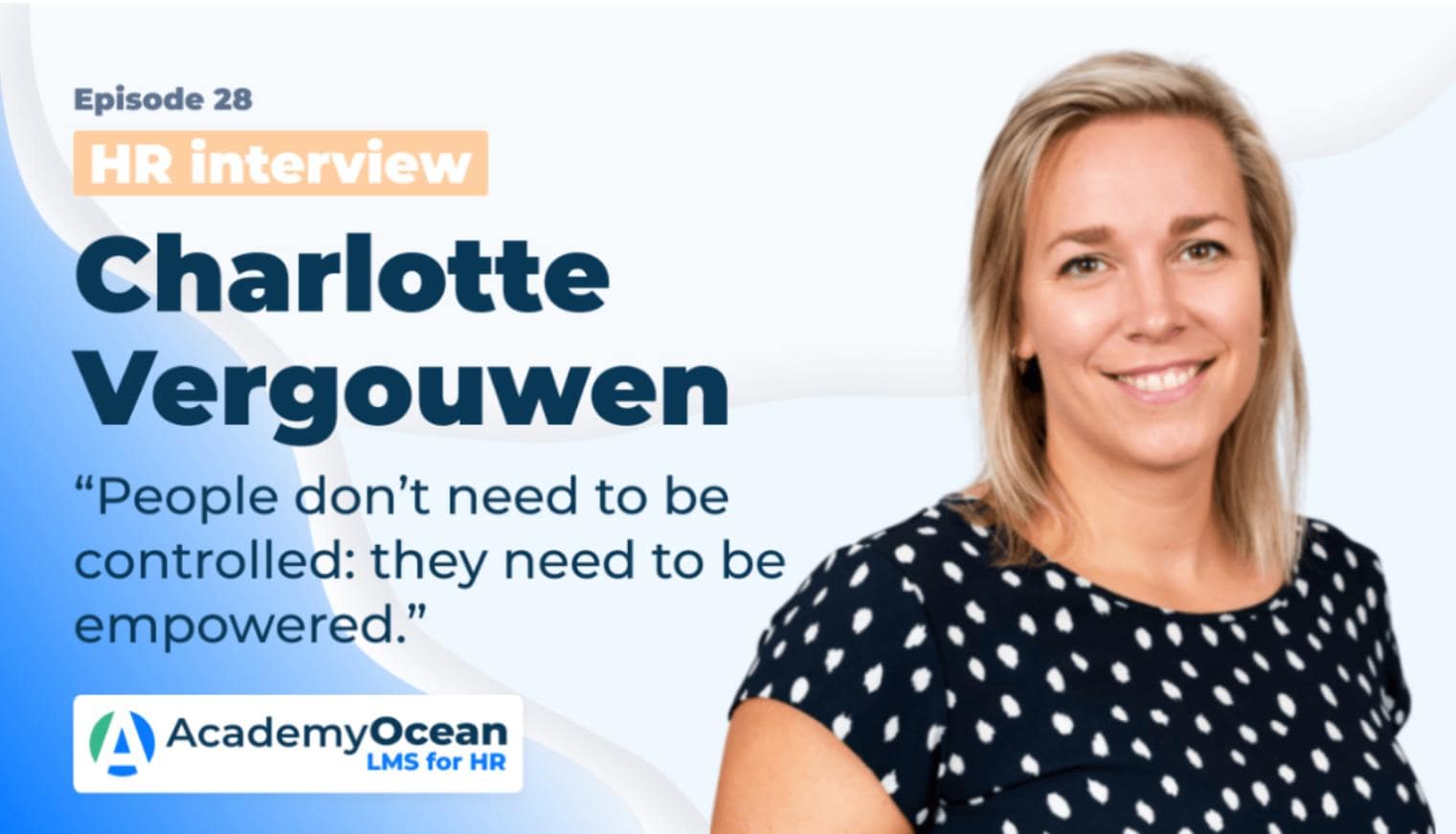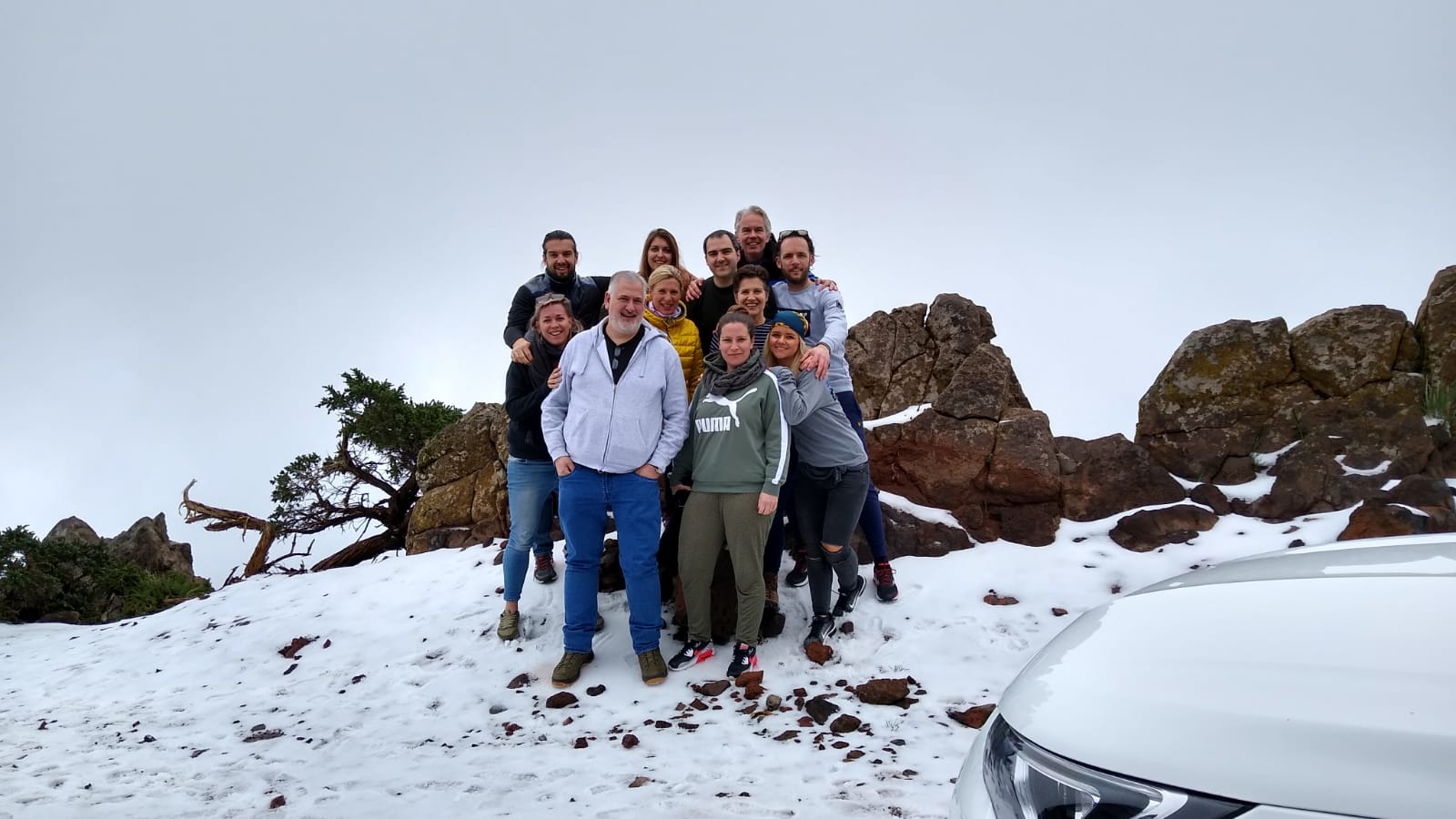Interview #28 Charlotte Vergouwen: "People don’t need to be controlled: they need to be empowered"

📌 Read the interview with Charlotte Vergouwen to find out fascinating company traditions and how to build a well-structured onboarding process for new hires.
Hi there!
Do you know that one-third of managers say they generally decide within 90 seconds if they will hire a candidate? More fascinating facts you will find out in our new interview.

Today, our guest is Charlotte Vergouwen. She is working as an HR professional since 2009, started off in a small IT company and has worked in several organizations in a wide range of HR specialisms: from recruitment to salary admin and from performance management to reorgs.
In 2017 Charlotte encountered Holacracy and started getting familiar with new ways of organizing. Since 2018 she has been working independently, focussing on progressive organizations (self-managing/organizing) that want to design their HR practices accordingly.
Charlotte loves experimenting and collaborating with open-minded organizations. She loves traveling the world with her family.
"NRG Flow is one of these organizations, with a purpose to transform the Oil and Gas Industry, they are inspiring and one of the most progressive organizations I know. Last year we changed into a For Purpose Enterprise, meaning everyone is a co-owner of the organization and Purpose is our boss." – Charlotte Vergouwen
AO: Hello Charlotte and welcome to AcademyOcean. By tradition, let's start our interview with a question about the beginning of your career.Did you work somewhere before becoming an HR professional, why did you decide to become an HR?
C: My career started in HR. After studying Work and Organizational Psychology, I looked for an entry-level job and found this at a small IT company. The reason I wanted to do something in HR wasn’t so clear at that point. It just seemed like the coolest and most interesting part of the organization: where the human factor comes in.
Top Facebook Groups for Human Resources specialists, recruiters and talent acquisition managers
AO: Ok, and can you share your thoughts on why HR is an important function in any organization?
C: HR is such an important part of any organization because it deals with the human side of work. Since everything around us is changing rapidly, we as humans are supposed to keep up while dealing with all kinds of factors: beliefs that are outdated and holding people back, systems that are not designed to make people thrive. This is what our job in HR is about: facilitating, organizing and leading the way for people to reach their highest potential.

AO: Charlotte, let's look at the future for a second.Where do you see the HR industry in the next 5 years?
C: HR will have a bigger and more important role in the organization. I think organizations will more and more shift from a focus on growth and profit to a focus on purpose where growth and profit are merely the means to an end, not the goal itself. With this transformation, the old HR systems and models are not going to be helpful so we will need new ways to go about this.
We will go back to the core, the initial intention behind these systems and redesign them. Culture will be an important factor in all this: value-aligned people will be chosen above the smartest or most experienced. HR will be the driving force behind all this: putting this on the agenda and facilitating and molding the organization into an environment that enables people to thrive.
AO: According to Job Seeker Nation Study, 46% of job seekers cite company culture as very important when choosing to apply to a company and employees who don't like their organization's culture are 24% more likely to quit. So, we absolutely agree with your points.
AO: Speaking about the current year, what HR trends do you think will emerge in 2021?
C: With the current Covid situation it has become more and more apparent that the working life requests a different behavior, from the employees and the employers. There will be less and less controlling and demand, more and more autonomy, collaboration, dynamic and embracing people for who they are.

AO: Charlotte, working with people is not so easy as somebody may think.What difficulties do you usually face working as an HR specialist?
C: We need a mindset shift, not only in HR but also in the boardrooms. The biggest challenge there is all of us and in particular our thinking.
I only saw the true potential that lies in HR when I could step away from the traditional way of thinking.
First I learned how these traditional ways worked, then I experienced them and after a while, I started questioning them. It wasn’t until I read Laloux's "Reinventing Organizations" and came into contact with Holacracy that I realized there is a different approach and consciousness that will help us to move forward. Fears about the unknown, about our positions, about what others think of us, all are holding us back, so to explore these fears and see them as opportunities is what we need for everyone in organizations.
AO: We should definitely read this book too.
Can you name three areas that you feel need the most improvement, based on your understanding of common HR practices?
C: Organizational design: move away from individual power-held organizational structures like hierarchy and start looking for the core values that are really important and need a structure that breathes these values. For instance: people don’t need to be controlled: they need to be empowered. And invest in intrinsic motivation, not extrinsic.
Another thing we can change is to stop judging: by hiring people for a specific job and then criticizing them whenever they don’t fit the box is not helping anyone. See people for who they are, help them to get to know themselves and organize the work around their talents, to make it a win-win situation.
Investing in personal development is a third important factor. We often believe that personal development is something you should do outside of work but it really is beneficial for both parties to make this part of everyday work. We can facilitate this in workplaces so people can take authority in their lives, which will make them even better versions of who they are already.
AO: Great recommendations, Charlotte.
Let's move to the topic of new hires training. How does the onboarding of new employees go into your company?
C: At NRG Flow we have a different approach to hiring new colleagues. We start by explaining our process and setting clear expectations about it: an important part is that we empower the candidate: we want them to take authority in the process and explore with us if it will be beneficial to both to start working together.
During the process we first only focus on purpose and value alignment: as this is most important we don’t look at resumes: we only check if the culture aligns.
The second part is focused on skills and talents: what will you bring to the table and can we see that this will help our organization in our current phase. We don’t have predefined job descriptions so we can organize work around talent.
The third step is a Spiral Dynamics assessment to understand what drives the candidates and to check for self-reflection. The final step is to explain our earnings: since the organization is cooperative and everyone coming in will be a partner. Every step is part of an exploration, and every phase ends with a deliberate decision to move on to the next, both by the company as the candidate. After this, the onboarding starts with a 'newbie'.

This means the new partner starts the first month as a newbie in the organization. In this month you can do anything as long as you don’t work. The focus is to understand our way of working, to get to know the people and to dive into your own personal development: find your personal purpose.
During this first month, you check in with different experts/trainers and mentors to get informed. After this month a ritual follows and you will then officially enter the workspace. Then monthly check-ups are done and everything a new partner needs is made available. The only thing we say: ask for it because as an adult, you are most capable to take care of your needs.
Compare the LMS for employee onboarding
AO: Great, such a well-structured process. It deserves a lot of praise.
And, what traditions your company has and what is your favorite one?
C: The best one is our yearly workation. Every year we find an inspiring place in nature (abroad or in our home country) and we spend a whole week together: working, strategy sessions, quality time, cooking, feedback sessions and more. Just to focus and get inspired in each other's presence. This week is a guarantee for improved collaboration and new ideas.

Another ritual we have is the one with the newbie when the first month is coming to an end: as much of us come together and the newest partner gets to speak out an oath and signs the ‘association agreement’: an agreement on how we deal with each other as people. This is an important moment and has a high probability for tears, laughter and drinks.

AO: Wow, you have such an inspiring corporate culture. Signing the 'association agreement' is something new to hear about.
Charlotte, what is the most valuable professional development advice you have ever gotten?
C: The best development, which for me has been life-changing, is to find my purpose: my deeper wish, my contribution to this world. It takes some time and dedication and it might be scary but it brought me a lot of clarity: every decision after this is with much more ease and meaning. It has shifted my focus from 'smart ways to boost my career' to actually doing what I love and making an impact while doing it.
AO: Great 👍 Our last question is a bit extraordinary one.If the company you work on now were a person, what kind of person would it be?
C: This person is non-judgemental, seeing people as they are with all their potential already present, just waiting to be revealed. This person is fun and loving and challenges himself to transform the world into an even better place.
AO: Thanks a lot, Charlotte, for such a fascinating interview. We wish you all the best in your career development. Stay safe!
That's all for today, friends. See you at the next interview!
In case you would like to ask your own questions, write them down in the comments. Also, if you want to read an interview with a particular person, let us know.
Learn more about LMS for HR platform.
If you want to learn more about the HR field and find a lot of useful content, join the most secret HR group.
Take care 😇